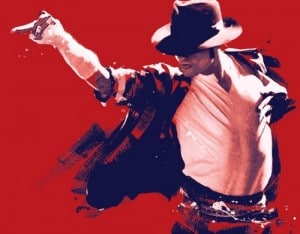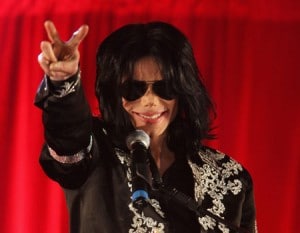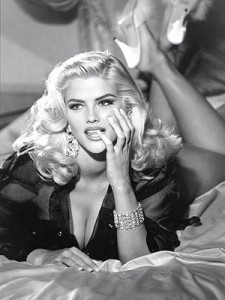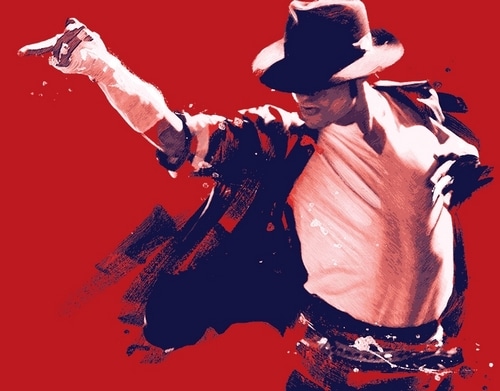
The fallen King of Pop was seen rehearsing for 50 comeback concerts at London’s O2 Arena, but with the first show fast approaching, he seemed to know he was heading for disaster, and his desperation was pitiful to behold.
He couldn’t even remember the words of his hit songs, much less sing them coherently, and his arthritic dance moves made mockery of the mercurial genius who had once created the moon walk.
‘It’s like I’ve got this giant fist in my ear,’ he complained, bizarrely, at one point, by way of explaining why he had aborted his run through for the umpteenth time.
Certainly, to Jackson’s obsequious inner circle, his producers, advisers, lawyers and physicians, it must have been blindingly obvious that this wraith-like 50 year old man was mentally and physically sick, and was being pushed beyond his limits.
And yet, with their own jobs and hundreds of millions of dollars at stake, they relentlessly drove him on.
Watching this slow motion car crash last weekend, one could well understand why, 18 months after Jackson died, there remains a widespread demand for someone to be held to account in a criminal court.
The question is, who?
Ever since Jackson was pronounced dead at the Ronald Reagan UCLA Medical Centre in Los Angeles, at 2.26pm on June 25, 2009, accusing fingers have been pointed in every direction. Several members of his family even claim that he was murdered.
Soon, though, it became clear that Steve Cooley, the veteran LA District Attorney in charge of the investigation, had one man in his sights: Jackson’s personal doctor, 57-yearold Conrad Murray.
Murray’s homes and clinics in Las Vegas, Houston and LA were raided, and computers and documents seized.
When his 27 year old girlfriend, former nightclub stripper Nicole Alvarez, 
Then, last February, the Grenadian born cardiologist, who had been hired just six weeks before Jackson died and was being paid nearly $200,000 a month to keep the singer functioning, was charged with involuntary manslaughter.
The prosecution alleges he attempted to treat Jackson’s insomnia by administering a lethal dose of propofol, a powerful anaesthetic drug normally used only before operations. If convicted, he faces four years in jail.
Murray’s trial is scheduled to begin on Tuesday, with a two week preliminary hearing to decide whether there is sufficient evidence of ‘unlawful killing without malice’ to place before a jury.
However, the first salvo in a legal battle being billed as the biggest celebrity case since that of OJ Simpson was fired this week, when a sensational aspect of Murray’s defence strategy was laid bare.
During a pre-trial argument between the prosecution and defence over who should test two syringes found in Jackson’s bedroom, LA Deputy District Attorney David Walgren said Murray’s lawyers would try to prove that the star took his own life.
‘I do think it’s clear the defence is operating under the theory that the victim, Michael Jackson, killed himself,’ he said.
Hours before Jackson died, he had summoned Murray to his rented mansion complaining that he was unable to sleep. The doctor then spent several hours alone with him.
When interviewed by detectives soon after Jackson’s death, Murray is said to have admitted giving him sedatives and a small quantity of propofol, fed through an IV drip.
In evidence, however, Murray is expected to claim that he left the room for two minutes to go to the bathroom, whereupon Jackson awoke from his fitful slumbers and dosed himself with a massive fatal quantity of the anaesthetic.
Did he really commit suicide?
Well, he was certainly extremely depressed, and for good reason. Leaving aside his drug dependency and his psychological debilities, he was about $500 million in debt, and his once glittering career had been ruined by
a series of child sex scandals.
Heaped on top of all this was the monumental stress of trying to recreate his old magic, night upon night, for the forthcoming concerts that would either restore or irreparably break his reputation.
But as the Jackson family’s long-time lawyer, Brian Oxman, the defence’s theory, though very convenient, seems far-fetched.
‘The science doesn’t stand up,’ he said.
‘Michael complained to many people of the burning effect of propofol. He would have been screaming in agony before he could get any meaningful amount of the drug into himself.’
He went on, ‘Yet we are being told by Murray that Michael injected himself with a full 125cc from the syringe. That is five times the amount Murray said he himself injected.
‘Also, propofol takes effect within ten to 15 seconds. By the time he had injected 25cc, about 15 seconds would have elapsed, and by then he would have been asleep. It just doesn’t make sense.’
Indeed not, and if Murray was being tried in the court of U.S. public opinion, he would surely be found guilty.
For despite attempts to portray him as a paragon of Hippocratic virtue (his attorney, Ed Chernoff, has even posted the names and phone numbers of grateful patients on his website, so the media can call them for a character reference), in many ways the doctor makes the perfect scapegoat.
The feckless father of seven children by various wives and mistresses, he has been pursued through the courts for unpaid child support, plus a variety of other debts…for years, and his medical practices have constantly teetered on the edge of bankruptcy.
But his luck turned in 2006 when he was asked to treat one of Jackson’s children for a minor complaint. He evidently impressed the singer and they became friends.
And when Jackson offered him a staggering salary to abandon his clinics and join his entourage for the London concerts, it was an easy decision to make. At the time, Murray owed his creditors more than $500,000.
There is every reason for questioning his judgment in compliantly giving Jackson regular cocktails of narcotics when it must have been patently evident from the skeletal, pock-marked body before him that he was dealing with a chronic drug addict.
For all this, however, one can’t help but wonder why he, or rather he alone, will be in the dock next week.
By Jackson’s own admission, his dependency dated back to 1984, when he began taking painkillers after an explosion on the set of a Pepsi commercial set his hair on fire.
And as his biographer J. Randy Taraborrelli says, down the years there must have been ‘many Dr Murrays’, all too willing to facilitate his habit.

Then there is AEG, the production company which stood to make more than £75 million from the O2 Arena concerts. Shouldn’t they bear some responsibility for placing such a huge burden on a performer who was palpably unfit?
Brian Oxman is certainly no apologist for Dr Murray, for he is acting for Jackson’s father Joe, who, in a separate civil court case, accuses the doctor of being responsible for his son’s ‘wrongful death’.
However, even the Jacksons’ lawyer is dismayed that the doctor is being left to carry the can.
‘The AEG group and the people who employed Conrad Murray must share the blame,’ he said.
‘They knew precisely what he was doing, and paid him to do it.
‘They say they had nothing to do with it, but if I hire a doctor to drug someone, and that person dies, I’d expect to be blamed because I’m the one paying the bills.
‘As if they didn’t know!
‘It’s tragic. He was essentially drugged to keep him working. He was fed this medicine because he complained of pain, and then the people who did all this put out the music, saying he was in terrific shape (just before his death).
‘But in the autopsy, it said he was suffering from pneumonia, brain swelling, chronic bronchitis and anaemia. Oh yes, he was in great condition. If your brain is swelling,
you belong in hospital, not on stage.
‘If you look at the photographs from the movie (This Is It), the dancers behind Michael are all about 20 or 25, and they are half naked. Yet Michael has three shirts on and a heavy jacket. He was freezing cold. Who are these people trying to fool?
‘Conrad Murray is going to bring this out. He is going to say Michael Jackson was in bad shape, and he told him he was in bad shape.’
If Murray is sent for trial, his attorney is expected to say much the same.
‘Conrad was at a lot of the rehearsals for This Is It, and he says Michael never made it through one single song,’ says a defence team source.
‘He didn’t want to go on there, but he had to, and Michael was saying: “If I don’t get any sleep I won’t be able to rehearse, and if I can’t rehearse I can’t do the concerts.”
‘He was a sick, 50-year-old man, and they expected him to dance like a 20 year old.
Imagine the pressure!’
Many observers would agree. Yet if that is the case, why has no one else been charged?
If we believe Murray’s Houston based pastor and confidant, the Reverend Floyd Williams, a veteran of the civil rights movement, there is a racial element to the case.
‘Why else would they accuse the only black doctor who treated Michael Jackson?’ he asks rhetorically. ‘It can’t be any coincidence that his other physicians were all white, and they won’t be going on trial.’
But according to Miranda Sevcik, who handles PR for Murray’s hotshot attorney, the LA authorities have pursued the doctor ‘purely because Michael Jackson’s name was associated with the case’.
The 18 month investigation cost a fortune at a time when the state of California was laying off workers it is strapped for funds, she says, so they felt compelled to charge someone…and Dr Murray was the easiest target.
Perhaps so, but the most likely explanation is that the case is politicallymotivated, the orchestrator being governor elect Jerry Brown, a long-time crusader against the abuse of prescription drugs.
During his tenure as California’s attorney general, Brown operated a purportedly unique data-tracking system to keep tabs on every doctor who prescribes drugs, the prescription name, the person for whom it is prescribed, the quantity and date.
It was used to investigate the death of gold digging model Anna Nicole 
As a result, her boyfriend and psychiatrist were convicted last October of conspiring to obtain drugs for her.
The verdict has sparked panic in Hollywood, and for very good reason. For decades, its luminaries have paid ‘tame quacks’ to slip them the illicit pills and potions that control almost every aspect of their lives, from their shape and size to their state of mind.
But Brown, whose tough guy image was a major factor in his reelection as governor last autumn, is a man on a mission, and the days when such drugs are available on demand may soon be over.
If Michael Jackson’s doctor is convicted, it will be a major boost for his campaign, and the prosecution are determined to nail him.
Ordinarily, preliminary hearings are swift and unremarkable, but it is planned to call some 35 witnesses, a process that will take at least two weeks.
Prominent among them will be Alberto Alvarez, the bodyguard who dashed to the scene of Jackson’s collapse after Murray called security and, with admirable calmness, alerted the paramedics.
Even by Hollywood standards, it promises to be quite some show trial, and every dramatic moment will be screened live on TV.
As a result, Conrad Murray will run a daily gauntlet of angry Jackson fans when he enters the downtown Superior Court.
But when the world’s most famous pop star dies in a manner which exposes the squalid underbelly of Tinsel Town, it seems that someone…anyone…must be made to pay the price.
by Wallace McTavish


